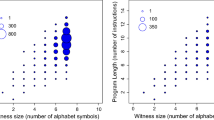Abstract
We study the average number of well-chosen labeled examples that are required for a helpful teacher to uniquely specify a target function within a concept class. This “average teaching dimension” has been studied in learning theory and combinatorics and is an attractive alternative to the “worst-case” teaching dimension of Goldman and Kearns [7] which is exponential for many interesting concept classes. Recently Balbach [3] showed that the classes of 1-decision lists and 2-term DNF each have linear average teaching dimension.
As our main result, we extend Balbach’s teaching result for 2-term DNF by showing that for any 1 ≤s ≤2\(^{\Theta({\it n})}\), the well-studied concept classes of at-most-s-term DNF and at-most-s-term monotone DNF each have average teaching dimension O(ns). The proofs use detailed analyses of the combinatorial structure of “most” DNF formulas and monotone DNF formulas. We also establish asymptotic separations between the worst-case and average teaching dimension for various other interesting Boolean concept classes such as juntas and sparse GF 2 polynomials.
Preview
Unable to display preview. Download preview PDF.
Similar content being viewed by others
References
Alekhnovich, M., Braverman, M., Feldman, V., Klivans, A., Pitassi, T.: Learnability and automatizability. In: Proceedings of the 45th IEEE Symposium on Foundations of Computer Science, pp. 621–630 (2004)
Anthony, M., Brightwell, G., Shawe-Taylor, J.: On specifying Boolean functions by labelled examples. Discrete Applied Math. 61(1), 1–25 (1995)
Balbach, F.J.: Teaching classes with high teaching dimension using few examples. In: Auer, P., Meir, R. (eds.) COLT 2005. LNCS, vol. 3559, pp. 668–683. Springer, Heidelberg (2005)
Blum, A.: Learning a function of r relevant variables (open problem). In: Proc. 16th Annual COLT, pp. 731–733 (2003)
Bshouty, N., Mansour, Y.: Simple Learning Algorithms for Decision Trees and Multivariate Polynomials. SIAM J. Comput. 31(6), 1909–1925 (2002)
Cherniavsky, J., Statman, R.: Testing: An abstract approach. In: Proceedings of the 2nd Workshop on Software Testing (1988)
Goldman, S., Kearns, M.: On the complexity of teaching. Journal of Computer and System Sciences 50(1), 20–31 (1992)
Goldman, S., Rivest, R., Schapire, R.: Learning binary relations and total orders. SIAM Journal on Computing 22(5), 1006–1034 (1993)
Kuhlmann, C.: On teaching and learning intersection-closed concept classes. In: Fischer, P., Simon, H.U. (eds.) EuroCOLT 1999. LNCS, vol. 1572, pp. 168–182. Springer, Heidelberg (1999)
Kushilevitz, E., Linial, N., Rabinovich, Y., Saks, M.: Witness sets for families of binary vectors. J. Combinatorial Theory 73(2), 376–380 (1996)
Lee, H., Servedio, R., Wan, A.: DNF are Teachable in the Average Case (full version), available at: http://www.cs.columbia.edu/~rocco/papers/dnfteach.html
Mossel, E., O’Donnell, R., Servedio, R.: Learning functions of k relevant variables. J. Comput. & Syst. Sci. 69(3), 421–434 (2004)
Roth, R., Benedek, G.: Interpolation and approximation of sparse multivariate polynomials over GF(2). SIAM J. Comput. 20(2), 291–314 (1991)
Schapire, R., Sellie, L.: Learning sparse multivariate polynomials over a field with queries and counterexamples. J. Comput. & Syst. Sci. 52(2), 201–213 (1996)
Seroussi, G., Bshouty, N.: Vector sets for exhaustive testing of logic circuits. IEEE Trans. on Information Theory 34(3), 513–522 (1988)
Author information
Authors and Affiliations
Editor information
Editors and Affiliations
Rights and permissions
Copyright information
© 2006 Springer-Verlag Berlin Heidelberg
About this paper
Cite this paper
Lee, H.K., Servedio, R.A., Wan, A. (2006). DNF Are Teachable in the Average Case. In: Lugosi, G., Simon, H.U. (eds) Learning Theory. COLT 2006. Lecture Notes in Computer Science(), vol 4005. Springer, Berlin, Heidelberg. https://doi.org/10.1007/11776420_18
Download citation
DOI: https://doi.org/10.1007/11776420_18
Publisher Name: Springer, Berlin, Heidelberg
Print ISBN: 978-3-540-35294-5
Online ISBN: 978-3-540-35296-9
eBook Packages: Computer ScienceComputer Science (R0)




